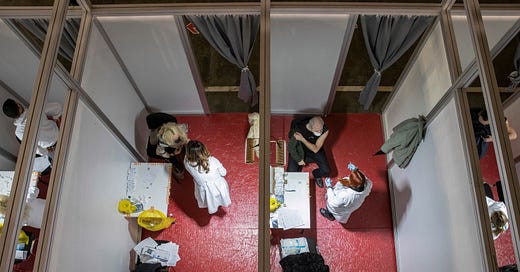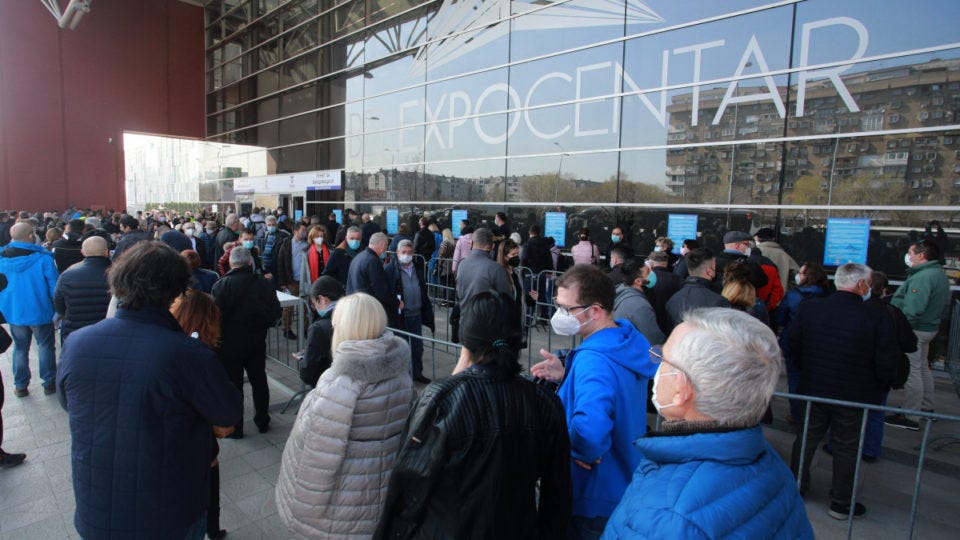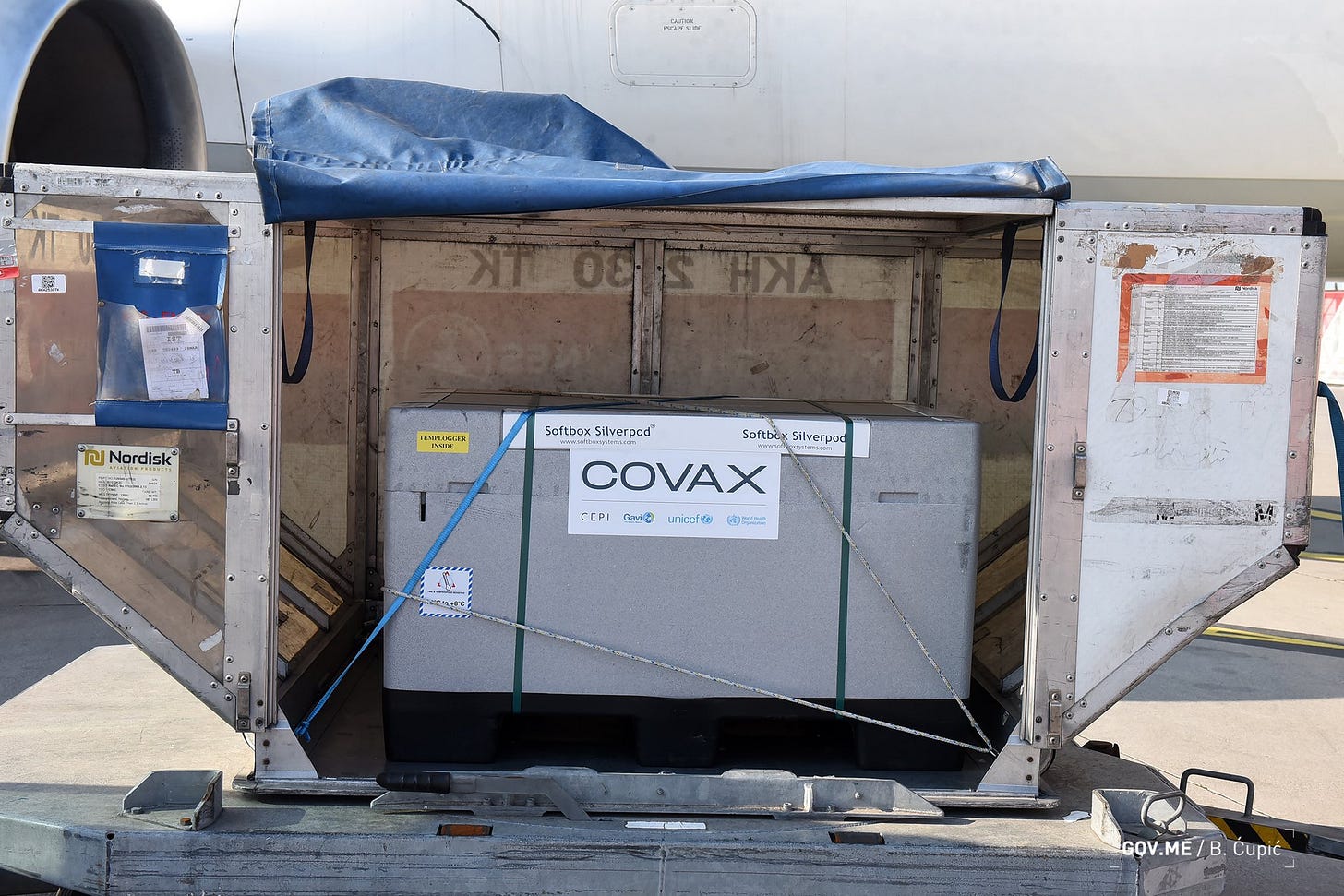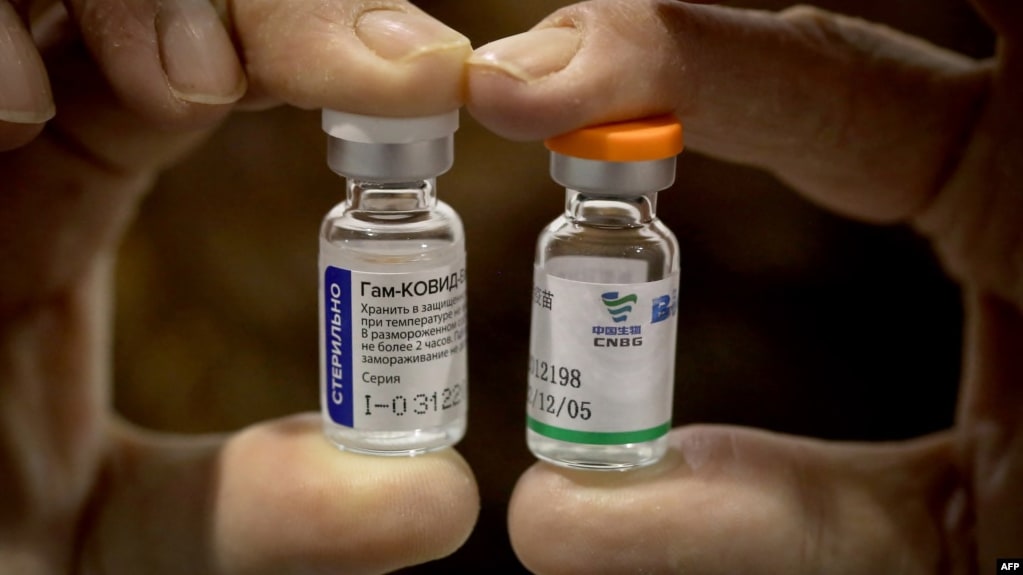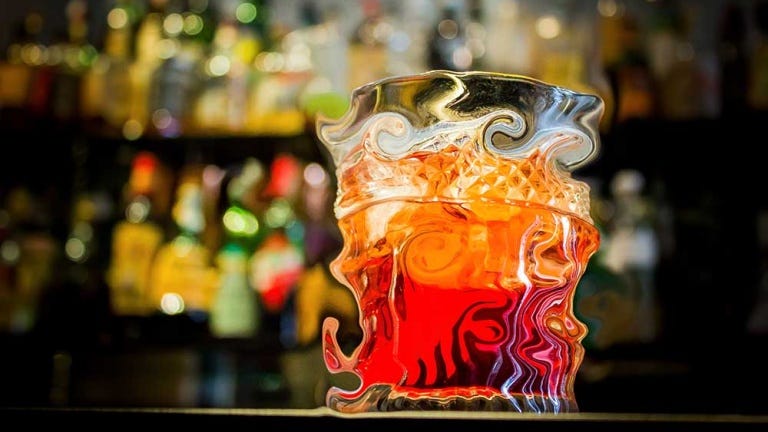XLI. The vaccine battle for Middle-earth
In the Balkans, the current fight against COVID-19 is intertwined with the future influence of the EU, Russia and China. All in Serbia's hands, thanks to its efficiency in vaccination campaign
Hi,
welcome back to BarBalkans, the Italian newsletter whose aim is to give a voice to the Western Balkans’ stories, on the 30th anniversary of the Yugoslav Wars.
So let’s be honest.
We should have investigated the topic of Coronavirus in the Western Balkans a long time ago.
We have mentioned it several time, but at the end we have always focused our attention on something else. It was a specific editorial choice: we needed and still need other news, besides those related to the pandemic.
Now, the time has finally come to bring some order.
We do it now for a very personal reason.
On Wednesday 31 March - within a few hours - my friend and colleague, Riccardo Congiu, and I wrote an article about the vaccination campaign in the Western Balkans for our respective newspapers.
Without previous planning, of course.
If you understand Italian, here are the two articles:
If you cannot read Italian, this is why we will investigate this topic right now. A complete picture emerges from the integration (and translation) of these two articles.
Get comfortable. We are bringing on your smartphone the latest news like never before!
Hopes, delays and vaccine donations
How do the COVID-19 vaccines reach the Western Balkans countries?
Through contracts between national governments and pharmaceutical companies. Through donations or agreements with foreign countries. Or through the COVAX Facility.
The COVAX mechanism is a global initiative led by the World Health Organization aimed at ensuring equitable access to COVID-19 vaccines for low- and middle-income countries around the world.
In the first semester of 2021, 952,200 doses should be distributed to the six Western Balkan countries (out of over 18 million inhabitants). The first batches were expected by the beginning of March.
One month later, only one sixth of the planned jabs (160,200) have been delivered to Albania, Bosnia and Herzegovina, Kosovo, Montenegro, North Macedonia and Serbia.
They arrived in Tirana on March 12 (38,400), in Sarajevo on March 25 (49,800), in Pristina, Podgorica and Skopje on March 28 (24 thousand each), while still none in Belgrade.
Despite the fact that the other Balkan countries have very few doses available (barely enough to vaccinate health workers), Serbia was able to take a different path.
Thanks to a pandemic management based on relations with the United States, the European Union, Russia and China, President Aleksandar Vučić set up an effective and timely mass vaccination campaign.
Not only through the COVAX Facility, but also through contracts with pharmaceutical companies (AstraZeneca and Pfizer/BioNTech) and agreements with Russia and China to receive the Sputnik V and the Sinopharm vaccines, respectively.
In this way, Serbia has achieved one of the best rates of COVID-19 doses administered per 100 people in Europe: 34.15, while the EU average is 15.5.
Two million single doses have already been administered, out of less than 7 million inhabitants.
This is how Belgrade has been able to develop a foreign policy in the region, using the instrument of COVID-19 vaccines.
Thousands of doses have been sent to other Balkan capitals since mid-February. Eight thousand jabs of the Pfizer/BioNTech vaccine in Skopje, 4 thousand of the Sputnik V vaccine in Podgorica and 10 thousand of the AstraZeneca vaccine in Sarajevo.
Serbia has not forgotten to improve its strategic influence on Republika Srpska. The Serb-populated portions of Bosnia and Herzegovina received 22 thousand doses of Sputnik V vaccine and was able to start the vaccination campaign before the rest of the country.
During the last weekend of March, Belgrade showed that it was possible to do even the unthinkable.
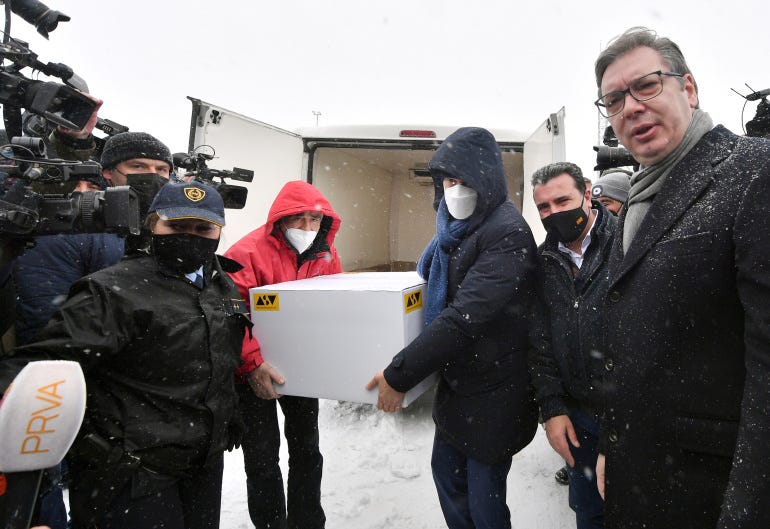
Strategic charity
On March 27 and 28, thousands of people flocked to Novi Sad, Belgrade and Nis, where the Serbian authorities offered free jabs of the AstraZeneca vaccine.
What is the news?
That the vaccination centers were open to the citizens of neighboring countries.
This initiative was unprecedented. Crossing the national borders, Macedonians, Bosnians and Montenegrins took advantage of the speed and ease of access to vaccination in Serbia. They needed nothing more than a passport.
The vaccination campaign on 27-28 March was part of an agreement between the Chamber of Commerce and Industry of Serbia and the national authorities of the other Balkan countries. Initially, only businesspersons were supposed to get vaccinated through 10 thousand jabs, in order to facilitate the recovery in regional trade.
For several reasons, everyone was eventually allowed to stood in line.
First of all, we have to consider the official version(s) of the Serbian authorities. In an interview for the Financial Times, President Vučić explained that «Serbia will not be safe until the entire region is inoculated».
Prime Minister Ana Brnabić went a little further. The exceptional vaccination campaign was open to everyone because between 20 and 25 thousand jabs risked expiring in early April, she told.
We can legitimately ask why all these doses risked being unused, if the mass vaccination campaign is so effective.
The journalist Valerie Hopkins explained it well. According to the data provided by the peer-reviewed general medical journal The Lancet on willingness to be vaccinated domestically, the situation in Serbia is worrying.
More than three Serbian citizens out of five express doubts about (or are against) COVID-19 vaccines.
It means that the curve of COVID-19 doses administered per 100 people may begin to flatten soon, if Serbian citizens stop getting inoculated.
Consequently, thousand of jabs risks accumulating in warehouses and going to waste.


And finally, there is a more purely political and geo-strategic issue.
As COVID-19 vaccines have become a powerful instrument of foreign policy, Serbia has every reason to improve soft power in the region.
Since the country has shown that it can effectively manage the vaccination campaign, Belgrade’s leading role in the Western Balkans is expected to increase.
And it is attracting interest from Russia and China, the two Eastern powers that are trying to contend with the European Union for the influence in the region.
The battle for Middle-earth
Since the pandemic broke out and the vaccination campaign on the continent has begun, Brussels has shown difficulty in releasing statements with timely action.
The EU supports the COVAX Facility with over one billion euros and established a support scheme to the Western Balkans.
However, the European Commissioner for Neighborhood and Enlargement, Olivér Várhelyi, admitted that «the delivery of COVID-19 vaccines to the Western Balkan countries is more difficult than we had hoped for».
These difficulties play into the hands of Russia and China, facilitating their strategy of destabilizing the EU enlargement policy.
This is especially true for the EU closest competitor, the Kremlin.
The rate of COVID-19 doses administered per 100 people in Russia is 7.26, less by half compared to European countries. The Sputnik V jabs seem to be more useful for the Kremlin’s geopolitical strategy than for inoculating the approximately 146 million Russian citizens.
This strategy also applies to the Western Balkans. Serbia plans to start domestic production of the Russian Sputnik V vaccine on May 20.
The Serbian Minister for Innovation, Nenad Popović, following a meeting in Moscow with the Russian Minister for Trade, Denis Manturov, on March 11 announced that «the first phase will involve the delivery, packaging and distribution of jabs from Russia».
China is doing the same.
There is no official confirmation, but plans are being made for the local production of the Chinese Sinopharm vaccine, starting from mid-October.
China and Russia are aiming to win over public opinion in the region thanks to COVID-19 vaccine supply chains in the most efficient Balkan country at the moment.
To win the vaccine battle for Middle-earth will lead to widen the European or Sino-Russian sphere of influence in the Western Balkans.
Pit stop. Sittin’ at the BarBalkans
We have reached the end of this piece of road.
The start was somehow self-referential. We will end in the same way.
If we met in our beloved city, Milan, Riccardo and I will would welcome you to the “Colorificio” bar, strictly with a glass of Negroni in our hands.
However, as you know, we are at the BarBalkans and here we do certain things differently.
A Rakoni, the Balkan cousin of the famous Italian cocktail, is waiting for us.
It is a classic Negroni, but using rakija instead of gin.
It is difficult to think of new versions of a milestone of aperitifs.
But you can get a perfect mix between the two shores of the Adriatic - a new atypical but strong alcoholic identity - when the most famous Balkan spirit is on the bar.
Rakoni recipe is identical to that of the original Negroni, with the same doses.
Bitter Campari, red vermouth and rakija instead of gin.
Let’s continue the BarBalkans journey. We’ll meet again in a week, for the 42nd stop.
A big hug and have a good journey!
BarBalkans is a free weekly newsletter. Behind these contents there is a lot of work undertaken. If you want to help this project to improve, I kindly ask you to consider the possibility of donating. As a gift, every second Wednesday of the month you will receive a podcast with an article about the dissolution of Yugoslavia.
If you want a preview, just listen to the last episode of BarBalkans - Podcast: you can find it on Spreaker and Spotify! The next one will be on Wednesday, don’t miss it!
As always, I thank you for getting this far with me. Here you can find all the previous newsletters.
If you want to help me to make this experience grow, you can invite whoever you want to subscribe to the newsletter:
Pay attention! The first time you will receive the newsletter, it may go to spam, or to “Promotions Tab”, if you use Gmail. Just move it to “Inbox” and, on the top of the e-mail, flag the specific option to receive the next ones there.
BarBalkans is on Facebook and Instagram, while on Linktree you can find the updated archive.

